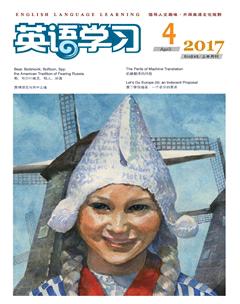有感周有光
林巍
原 文
[1] 得知周有光先生的去世,我思绪万千,伫立良久,一时不知用怎样的语言来表达。
[2] 111岁的人生,特别是对一个学者,算是难得的了,但我觉得作为一个 “例外”(他曾说,上帝太忙,把他回归的事给忘了),他的神话还应该再延续一段。
[3] 我虽没有见过周先生,但我的心距他很近。他住在北京沙滩后街,我原住北京西四,地理位置接近。更主要的是,我常阅读、翻译他的书,关心着他的事。前两天,我还向耄耋的父母提起周先生,说他们要像他那样想得开,勤动脑,活百岁。
译 文
[1] After learning the news that Mr. Zhou Youguang had died, I stood there for a moment in silence with a myriad of thoughts and moods all at once, and was at a total loss for words.
[2] He passed away at the age of 111, which is quite rare for a scholar. Concerning his longevity, he once said “God is too busy to bring me back to heavens”, I still nevertheless fantasized that this myth could continue much longer.
[3] Although I was not fortunate enough to meet Mr. Zhou, my heart was very closely related to his. This may partly be due to my residence in Xisi, Beijing, which is not far from Shatan
Houjie where he lived. More importantly, I have been reading and translating his books, and concerned about everything relevant to him all the time. Just several days ago, I mentioned him to my parents, both in their eighties, setting Mr. Zhou as a paradigm for them to follow in terms of optimism, diligence and longevity.
譯 注
在[1]中,关于“去世”有多种译语,比较委婉的有pass away, go off, go aloft, pass on等,此处先用了较为客观的die,下面再转用他词;而kick the bucket 等则是较为不敬的用法。“我思绪万千,伫立良久”不妨整合为一句,且前后次序可调整。“不知用……语言来表达”有多种译法,如…is beyond expression/any expression; …is hard to put my feelings into words; It cannot be expressed by words等,这里译得较为通俗。
在[2]中,这里的“例外”显然是指他的长寿(longevity),故可不必译成special case, exception等,而括号中的(他曾说,……)也可在译文中展开。
在[3]中,“没有见过周先生”没有译成I didnt meet Mr. Zhou,而是用了was not fortunate enough to…,表现的是一种情感和愿望,即若是生前能见他一面该多好!“地理位置接近”似可译成 We are geographically closed,但在两地之间有了which is not far from…已够明了。同时,对于“想得开,勤动脑,活百岁”亦不宜按字面意思翻译,而可做些相应变通。
原 文
[4] 生于1906年,周先生经历了数个时代,见证了无数的社会动荡。他在日本留过学,在美国工作过,还游历了很多国家,同爱因斯坦有过几次交谈。在世时,他每日读书,关注国内外事态,百岁之后每年还能出版一两本书。他精通英、法、日三种外语,一生著述三十余部,涉及经济、语言、文化等多个领域。他说,老来才知什么是“温故而知新”。
[5] 当然,我最钦佩周先生敢讲真话的勇气。
[6] 他在110岁时说:民国时期民众有文化,学界有国际一流学术成果,社会有言论自由,教师能教出
译 文
[4] Born in 1906, Mr. Zhou Youguang experienced several regimes and countless chaotic social conditions around him. He studied in Japan, worked in the United States and travelled to many countries. He even had several conversations with Albert Einstein! Reading was routinely part of his life. He said, in his twilight years, that he had realized what it meant to “gain new insights through reviewing old knowledge”. Being proficient in English, French and Japanese apart from his native Chinese, he was always well informed and up-to-date with domestic and foreign affairs. In total, he wrote more than 30 books (including one or two books a year after his hundredth birthday), in the fields of economics, linguistics, culture and other subjects.
[5] Most of all, I admired his courage in speaking the truth.
[6] At the age of 110, he said, the Republic of China was my favorite historical period, in terms of the culture of the
译 注
在[4]中,对于“在世时,……‘温故而知新”的内容,因思维方式问题,在英文里需将内容进行调整,即“合并同类项”:“读书”(reading)是其在世时一种日常行为,可单为一句;“温故而知新”是其“百岁之后”和“老来”以后的事,故可置于其后,同时还可译为look for the old so as to learn the new; gain new insights through reviewing old material; gain new knowledge by reviewing old等;至于“一生著述三十余部”和“百歲之后每年还能出版一两本书”属同一类别,可合为一处,如In total, he wrote more than 30 books(including one or two books a year after his hundredth birthday) 等。总之,要尽力使原语适应译入语的表达规律和习惯。
在[5]中,关于“勇气”,通俗的有gut, nerve等,如It takes guts to start a new business on your own(自己开公司是需要勇气的); Not everyone has the nerve to stand up and speak in front of a large audience(不是每个人都敢在大庭广众前讲话的)等,但正式些的还应为courage,如They ascribed courage to me for something I did out of sheer panic(由于我纯粹因惊慌而做的事,他们认为我很有勇气)。
原 文
好人才。现在说大师,都是那时候出来的。你可以一个一个查,都是。这是事实,清楚得很,不用辩论”。
[7] 他认为,“什么叫真理呢?真理,可以今天批判它、否定它,明天还可以批判它、否定它,在不断被批判被否定当中能站得住,那才是真理。如果不许批评,那怎么是真理呢?有一点是非常清楚的,意识形态是不许批评的,意识形态是用来信仰的。只能信仰,不能批评,所以意识形态不能跟社会科学混起来讲”。
[8] 这些观点和话语,闪烁着一个百多岁老人的睿智和人格。如今,斯人已逝,但我相信,人的精神其实不会随着其肉体而消亡,其生命力会更加持久。
译 文 populace, international-standard academic achievements, freedom of speech, etc. Outstanding personnel were produced by educating them, and great masters, by todays standard, emerged one after another—a fact that is so clear and beyond any doubt”.
[7] Concerning “What is truth?”, in Mr. Zhous view, the truth is something that stands up to various criticisms and denials day in and day out. In other words, only by withstanding all kinds of tests, can the truth finally be proven. It is therefore inconceivable that the truth can be accepted when criticism is prohibited. Ideology surely cannot be criticized but can only be embraced, as it is a belief, which should not be confused with social science.
[8] These ideas and viewpoints, embodying the wisdom and character of a centenarian sage, I believe, should not perish with his mortal body but remain in this world indefinitely.
译 注
在[7]中,“真理,……那才是真理”其意为真理是怎样性质的一种东西,故不妨用the truth is something that…。“如果不许批评,那怎么是真理呢?”是个反问句,但亦可正译。“意识形态是不许批评的,……不能跟社会科学混起来讲”亦多有口语成分,翻译中可以精简;而“意识形态是用来信仰的”意味着“意识形态即信仰”(as it is a belief),这与动词的“信仰”(embrace)相吻合。
在[8]中,“斯人已逝”与“随着其肉体而消亡”可整合考虑,只用一个词(如perish, pass away等)。“这些观点和话语”为主语,其后的动词至“……不会”之前可译为定语和状语,而“人的精神”与前面的“睿智和人格”实为同义语,故可融为一体翻译。

